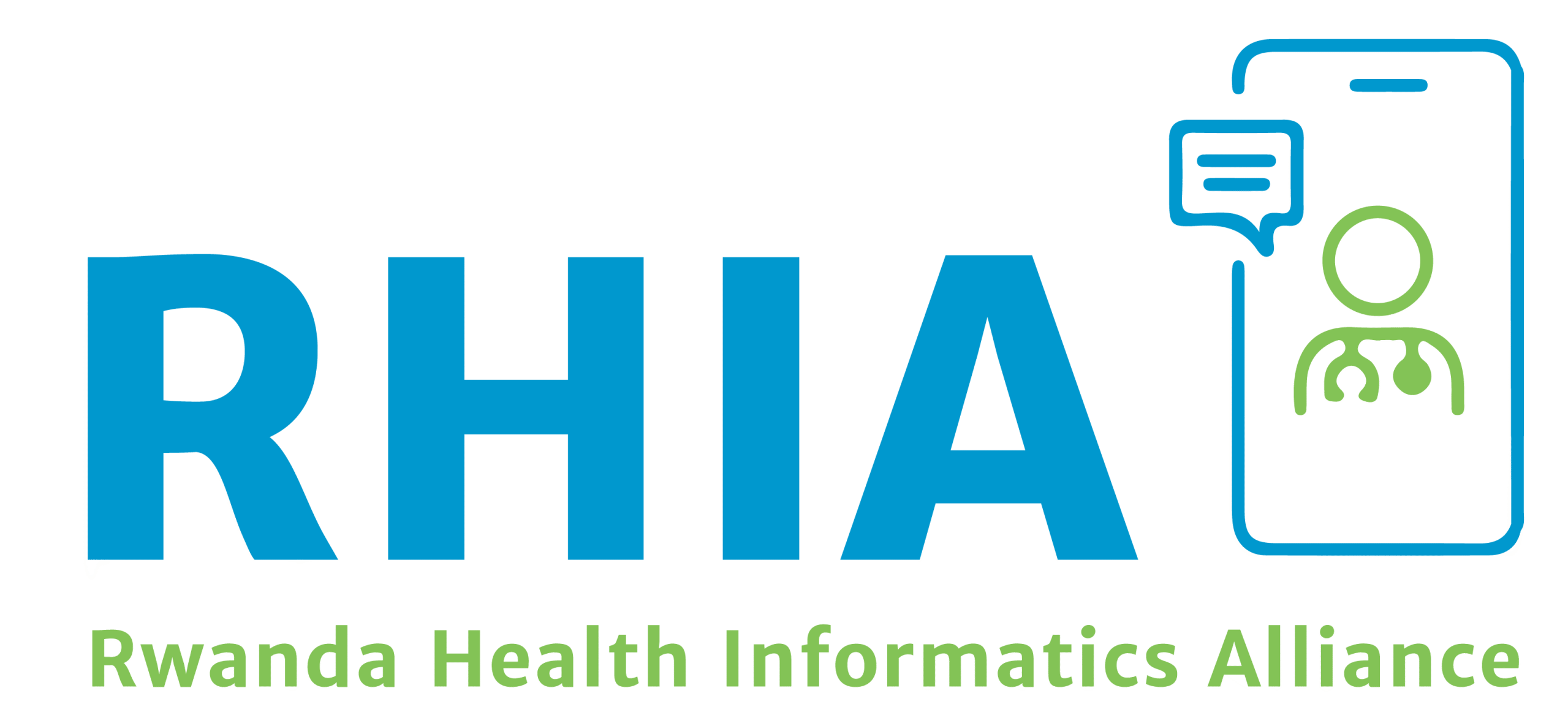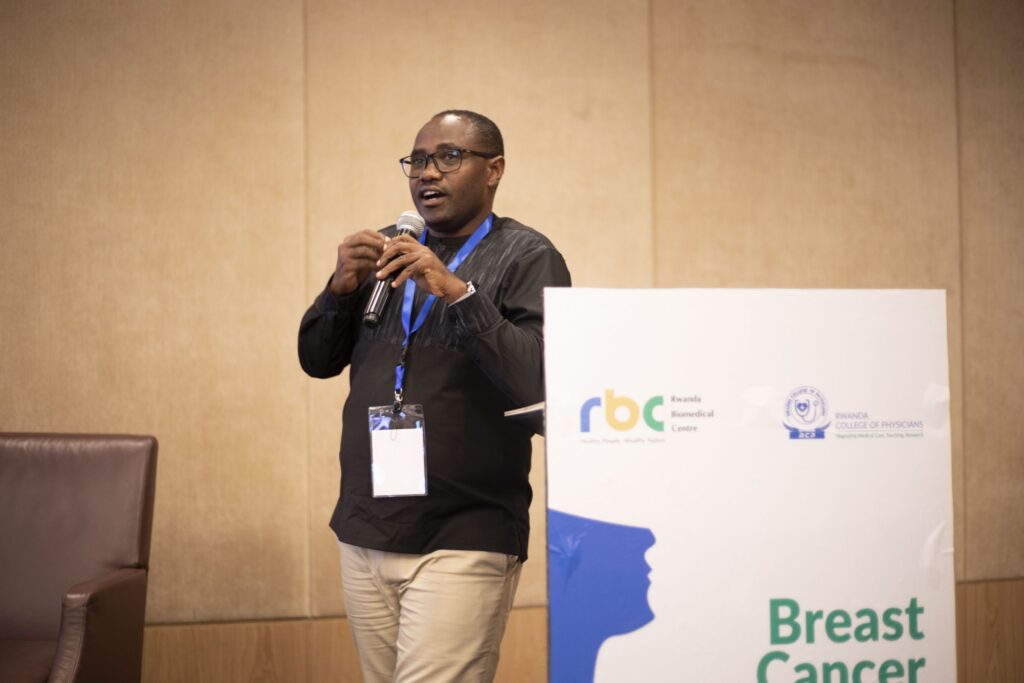Health Data Governance Awareness in the Second Edition of the Breast Cancer Symposium
Date: August 31, 2024
Location: Marriott Hotel, Kigali
Organizers: Rwanda Health Informatics Alliance (RHIA) and Rwanda College of Physicians (RCP)
Participants:
The symposium gathered 40 participants from a range of institutions, including Butaro Cancer Center, Pfizer, Partners in Health (PIH), and Rwanda Social Security Board (RSSB), each represented by 1 participant. RBC had 5 participants, Rwanda Community Pharmacists (RCP) had 4, and the Ministry of Health (MoH) was represented by 2. King Faisal Hospital (KFH) had 7 participants, Rwanda Military Hospital (RMH) had 4, and the University of Rwanda (UR) had 3. The Rwanda Health Informatics Alliance (RHIA) was represented by 4 participants, while there was 1 representative from East Africa (Kenya, Tanzania, and Uganda) and 2 from other institutions.
- Introduction
The Second Edition of the Breast Cancer Symposium, co-hosted by the Rwanda Health Informatics Alliance (RHIA) and Rwanda College of Physicians (RCP), took place on August 31, 2024, at the Marriott Hotel in Kigali. This symposium emphasized improving breast cancer care in Rwanda, while also integrating Health Data Governance (HDG) principles into existing cancer care strategies. By fostering collaboration among healthcare professionals, researchers, and policymakers, the symposium provided a platform to address the challenges of breast cancer and explore innovative solutions.
1.1. Purpose of the Symposium
The symposium had two key objectives: to address the complex challenges of breast cancer care in Rwanda and to promote the integration of Health Data Governance (HDG) principles into cancer care strategies. As breast cancer continues to be a leading cause of mortality among women globally and is becoming more prevalent in Rwanda, this symposium gathered diverse stakeholders from institutions such as RBC, RCP, MoH, the Human Resources for Health Program, UR, PIH, RSSB, Pfizer, hospitals, East African Community (EAC), and RHIA. Together, they discussed strategies to enhance breast cancer prevention, diagnosis, treatment, and research, while also focusing on the importance of health data governance.
RHIA, in collaboration with RCP, aimed to showcase the significance of HDG principles in improving patient care and developing sustainable health systems.
- Symposium Highlights
2.1. Panel Discussion on Health Data Governance Principles in Cancer Care
A key feature of the symposium was a panel discussion on Health Data Governance (HDG) principles in cancer care, led by the RHIA HDG Technical Working Committee. This session brought together a diverse range of healthcare professionals, including representatives from the Ministry of Health (MoH), RBC, RCP, UR, PIH, practicing medical doctors representing their health facilities, social securities and health experts from east Africa. The HDG principles was presented and participants were urged to consider how these principles could be integrated into their organizational strategies.
The panel sparked significant engagement, with participants discussing how to leverage HDG for better decision-making, patient outcomes, and data-driven healthcare policies. Stakeholders were encouraged to advocate for the integration of HDG in their respective institutions.
2.2. Presentation by Mr. Sylvere Mugumya on Health Data Governance
Mr. Sylvere Mugumya, representing RHIA, delivered an insightful presentation on the role of Health Data Governance in cancer care and its impact on universal health coverage. His presentation highlighted the importance of structured, reliable data systems in improving cancer prevention, treatment, and overall patient outcomes.
During presentation, Mr. Sylvere emphasized on the following HDG principles and their relevance to cancer care:
- Build Trust in Data Systems: Transparency and accountability in data collection, storage, and use are essential to build public trust. This trust encourages participation and ensures that health data is used ethically and effectively.
- Ensure Data Security: Robust security measures must be in place to protect sensitive health data from unauthorized access, breaches, and misuse. This includes encryption, access controls, and regular security audits to safeguard patient information.
- Protect Individuals and Communities: Safeguarding the rights and privacy of individuals and communities is critical. Data must be used in ways that do not harm individuals, and informed consent should be obtained when collecting personal health information.
- Enhance Health Systems and Services: Health data should be used to improve the efficiency, quality, and accessibility of healthcare services. Data-driven insights can inform policy-making, resource allocation, and program development.
- Promote Data Sharing and Interoperability: Facilitating the secure sharing of health data across systems and institutions is key to improving patient care and outcomes. Interoperability allows healthcare providers, researchers, and policymakers to access and use health information effectively.
- Facilitate Innovation Using Health Data: Health data can drive innovation in healthcare, such as developing new treatments, improving diagnostics, and advancing personalized medicine. Data holds the potential to transform healthcare solutions.
- Promote Equitable Benefit from Health Data: Health data should benefit all segments of the population equitably, particularly marginalized or vulnerable groups. This ensures that healthcare disparities are addressed and reduced.
- Establish Data Rights and Ownership: Individuals and organizations should have clear rights regarding the ownership and control of health data. This includes the right to access, correct, and control the use of personal health information.
Mr. Mugumya’s insights underlined the importance of integrating HDG principles into cancer care, enabling healthcare providers to make data-driven decisions that improve patient outcomes while protecting privacy and promoting equity in healthcare.
- Conclusion
The symposium successfully brought together key stakeholders to discuss the challenges and opportunities in breast cancer care in Rwanda. The discussions around Health Data Governance and workforce development were particularly impactful, generating significant interest among participants. There was a strong call for continued efforts to raise awareness and build capacity around HDG principles. RHIA, in collaboration with government institutions and professional associations, was encouraged to allocate time and resources to support the integration of HDG into operational strategies across healthcare systems.
By focusing on the integration of HDG principles, the symposium laid the groundwork for improved data-driven decision-making, better patient outcomes, and the development of innovative healthcare solutions tailored to Rwanda’s needs. This collective effort has the potential to strengthen cancer care and contribute to building a more resilient healthcare system in the country and in Africa.
Prepared by RHIA Team
- Mr NTAGANZWA Roger
- Mr MUGUMYA Sylvere
- Miss KAZUMUHIRE Console
- Mr GAHENIMANA Fabien

